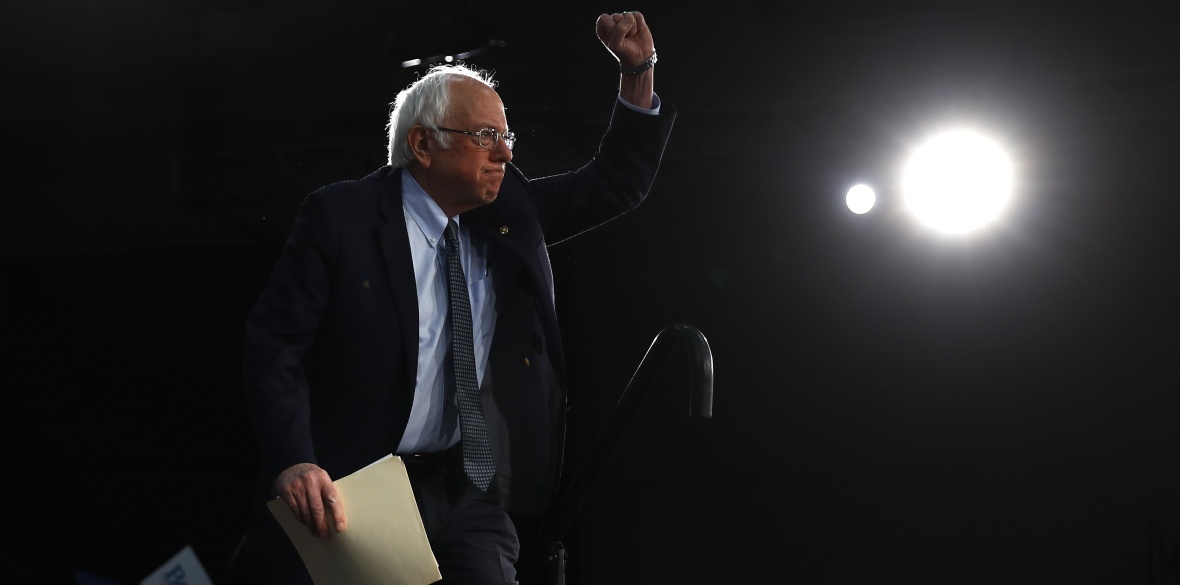DONALD TRUMP’S claim to be the true victor of the Democrats’ shambolic Iowa caucus is mockery rather than analysis.
But it’s a salutary reminder of the consequences of liberal efforts to squash the socialist left — one that ought to inform campaigners on both sides of the Atlantic.
Reports of the chaos caused by an apparently flawed app raise the old “cock-up or conspiracy” dilemma.
But the detail is less important than the spectacle of a Democratic party machine pulling out all the stops to prevent a Bernie Sanders victory — as it did in 2016, when the role of so-called “superdelegates” (delegates to the Democratic convention appointed because of their positions in the party rather than elected) was instrumental in ensuring Hillary Clinton beat Sanders for the nomination.
We all know what followed. Yet despite Clinton’s humiliating defeat by Trump in an election that polls suggested Sanders would have won, the same tired narrative is being trotted out now by Pete Buttigieg, Joe Biden and others: that Democrats should avoid voting for Sanders because he couldn’t win an election.
It’s familiar. The line was deployed against Labour’s Jeremy Corbyn in the 2015 and 2016 leadership contests. After he bagged the party its biggest vote-share increase for 72 years it disappeared for a while before being resurrected once the People’s Vote operation had rewritten history and mangled the evidence to argue that Labour’s 2017 result was thanks to conditional support from Remain voters rather than a vote of confidence in its policies or leader.
It’s also nonsense, in fact more or less the opposite of the truth. Clinton’s very acceptability to the political Establishment was a huge liability against Trump. Sanders’s anti-system credentials make him far better placed to appeal to the spirit of revolt sweeping the West than his rivals. Ironically, Clinton’s childish attack on Sanders last month — “Nobody likes him, nobody wants to work with him” — actually points to his appeal as someone without the “friends in Washington” that US citizens are sick of.
Does this matter in Britain? Yes, because only a Sanders presidency would offer any break (however limited and resisted) from the US record of imperialist aggression around the world. For all House Speaker Nancy Pelosi’s grandstanding — symbolically tearing up Trump’s State of the Union address after he delivered it in Congress this week — Democrats lined up to vote for his swollen $738 billion military budget at the end of last year.
Yes, because a Sanders win would be a big boost for the socialist left internationally and help maintain a resurgence threatened by Boris Johnson’s victory over Labour in December.
And yes, because similar narratives are playing out in Labour’s own leadership contest. As Ronan Burtenshaw has perceptively noted in Tribune, Keir Starmer’s strong performance is linked to the idea that “Labour’s real problem was not playing the Westminster game well enough,” so it needs “a slicker parliamentary operation, closer relationships with the press and a return to focus-grouped professional politics.”
But Labour, in a strategy largely devised by Starmer, made a point of playing “the Westminster game” better than Johnson did. It boasted of humiliating him with successive parliamentary defeats, cheered on every decision by then speaker John Bercow to deny him what he wanted and exulted when he was slapped on the wrist by the Supreme Court.
The victories were not just hollow. They were counterproductive. They allowed Johnson to paint himself as an insurgent battling an Establishment of which Labour was part. For his part, he conspicuously declined to “play the game,” purging his party of some of its best known veterans and repeatedly affronting convention.
If the left hopes to beat the right either here or in the US, it cannot allow the very liberals responsible for its recent defeats to lecture it on electability. Even if they won’t learn from their mistakes, we have to.











